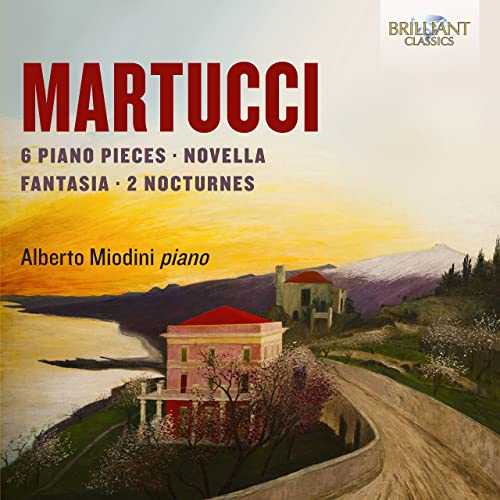
Composer: Giuseppe Martucci
Performer: Alberto Miodini
Audio CD
Number of Discs: 1
Format: FLAC (tracks)
Label: Brilliant
Size: 570 MB
Recovery: +3%
Scan: yes
6 Pieces, Op. 44 3
01. No. 1. Momento d’ozio
02. No. 2. Pezzo fantastico
03. No. 3. Colore orientale 1
04. No. 4. Barcarola
05. No. 5. Notturno
06. No. 6. Tarantella
07. Novella, Op. 50 1
08. Fantasia in G Minor, Op. 51 1
Notturno, Op. 70 1
09. No. 1. in G-Flat Major
10. No. 2. in F-Sharp Minor
Recorded: 16-18 November 2014
Recording Venue: Bartók Studio, Bernareggio, Italy
The symphonies and tone‐poems of Giuseppe Martucci (1856‐1909) have retained a place on the fringes of the repertoire outside his native Italy thanks to advocacy by Arturo Toscanini and, latterly, Riccardo Muti.
Martucci was a man of protean talents and unflagging energy, who excelled as a composer, pianist, conductor, teacher and moving force in musical culture. The direction of that force was set against the prevailing operatic scene of contemporary Italy – except, notably, where it intersected with German music. Thus he conducted Brahms, Liszt and especially Beethoven, as well as the Italian premiere of Tristan und Isolde. His own piano music is a continuation of the Lisztian tradition – at least, it becomes so, after flirting with the world of salon music in his early 20s. The six Op.44 Pieces are a much more substantial synthesis of elements from Italian popular culture – the gondoliers’ barcarola, the mule‐drivers’ tarantella among them – with a wideranging, elaborately contrapuntal and fiendishly virtuosic style which owes much not only to Brahms and Liszt but to the composer’s formidable powers of performance. The Novella Op.50 and Fantasia Op.51 experiment with more delicate textures in the manner of Chopin, and this tendency is further explored in the two Nocturnes Op.70, which move the form into late Lisztian realms of crepuscular harmony and dreamy phrases; the first of these Nocturnes became known in the early years of the last century through an orchestral transcription which was often programmed by Toscanini.
The pianist Alberto Miodini has studied these little‐known works for years and written the introductory essay for these new recordings. This is his second recording for Brilliant Classics, after a well‐received 4-CD set (BC94806) of Schubert’s piano miniatures and free‐standing pieces such as the Impromptus.



